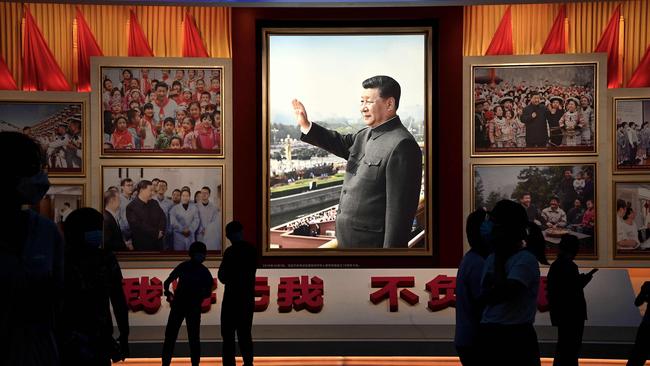Xi Jinping to break 970-day Covid isolation
The Chinese President will meet his Russian counterpart Vladimir Putin next week in a pointed return to the international stage.

Chinese President Xi Jinping will meet his Russian counterpart Vladimir Putin next week in a pointed return to the international stage that will end his almost three-year stay behind China’s strict “Covid zero” borders.
Mr Xi’s 970-day long period of Covid-induced Chinese isolation will finish on Thursday next week when he visits Kazakhstan, where he unveiled his globe-spanning Belt and Road infrastructure project in 2013.
China’s leader will then join Russia’s President and the heads of Central Asia’s increasingly Beijing-dependent Central Asian nations Kazakhstan, Kyrgyzstan, Tajikistan an Uzbekistan at a meeting of the China-backed security grouping, the Shanghai Co-operation Organisation in the Uzbek city of Samarkand.
Mr Putin on Wednesday hailed the growing role of the Asia-Pacific region in global affairs, as Moscow seeks to strengthen partnerships in Asia in the face of Western sanctions.
The role … of the countries of the Asia-Pacific region has significantly increased,” Mr Putin told the Eastern Economic Forum in Russia’s Pacific port city of Vladivostok, adding that partnerships would create “colossal new opportunities for our people”.
The overseas trip – Mr Xi’s first since his visit to Myanmar in early January 2020 – comes weeks before he is due to be given an unprecedented third, five-year term at a meeting of senior communist party officials in Beijing.
Raffaello Pantucci, an expert on China in Central Asia, said the trip to Kazakhstan would allow Mr Xi to draw attention to his signature foreign policy idea before that important political meeting.
“Kazakhstan is where he started the Belt and Road. This is his big foreign policy concept,” said Mr Pantucci, a senior fellow at London’s Royal United Services Institute for Defence and Security Studies.
Autocratic Kazakhstan and Uzbekistan are attractive backdrops for China’s stability-obsessed leadership during this politically sensitive period. “These are not events where you’re going to get, you know, pesky journalists asking awkward questions or … see any particular protests against him,” said Mr Pantucci, author of a new book Sinostan: China’s Inadvertent Empire.
Mr Xi’s return to the international stage after 32 months of diplomacy over video screen comes as China’s international reputation is at record lows in Europe, East Asia, North America, Australia and New Zealand.
Beijing’s relations have become further strained since China gave tacit support to Russia’s invasion of Ukraine, although ties remain strong with elites in Central Asia, Pakistan and many other low and middle-income countries.
Mr Putin launched his invasion in February, days after signing a “no limits” partnership with Mr Xi in Beijing where he was the guest of honour at the Winter Olympics. China’s propaganda machine and foreign ministry has blamed the war on the US.
Next week’s meeting between Mr Xi and Mr Putin will underline their efforts to reshape the US-led international order in their interests. The Uzbek and Kazakh governments confirmed Mr Xi’s upcoming visits.
Beijing is intensely secretive about the Chinese leader’s itinerary and declined to comment on the trip. “I have nothing to announce at this moment,” said Chinese foreign ministry spokeswoman Mao Ning.
Mr Xi is expected to attend the G20 summit in Bali in November, which will bring him face-to-face with the leaders of many countries disturbed by China’s assertive international behaviour and alarmed by Beijing’s support of Moscow’s war, including Australia’s Prime Minister Anthony Albanese. US President Joe Biden this week indicated he wants to have his first in-person meeting with Mr Xi in Bali, as negotiations continue between Chinese and American officials.
Mr Xi’s Belt and Road policy grew out of a strategy first articulated by the Chinese scholar Wang Jisi, who argued China should “March West” to pursue economic and diplomatic opportunities in Central Asia. Professor Wang argued a westward push would help build a “more balanced” US-China relationship.
There has been a huge growth in China’s trade and investment in the region over the past decade. However, contrary to Professor Wang’s advice, Beijing remains obsessed with contesting the US in the Pacific.
Mr Pantucci said China’s Xinjiang region was in many ways the “sixth Central Asian country”, with shared Turkic roots far removed from the rest of China. But during many years travelling and researching in the region, he found little concern about the appalling atrocities committed on Xinjiang’s Uighur population.
“It was always a kind of depressing element … I never found a huge amount of sympathy for the Uighur cause,” he told The Australian. “I mean, people were kind of aware of what was going on. But there was an element of: well, those people are Chinese and they live in China.”




To join the conversation, please log in. Don't have an account? Register
Join the conversation, you are commenting as Logout